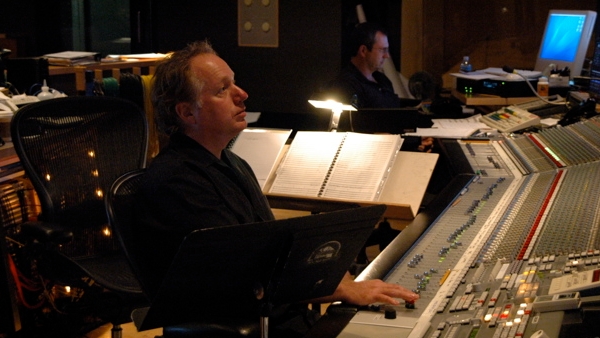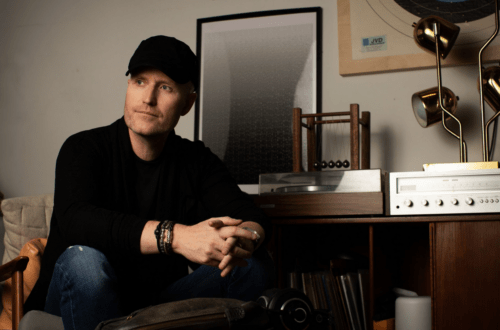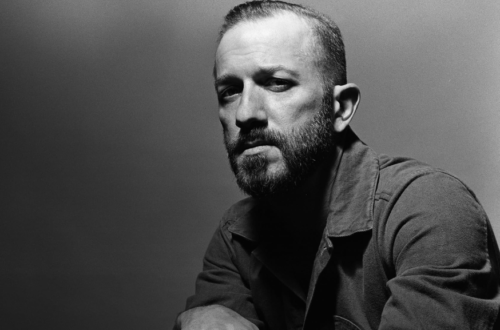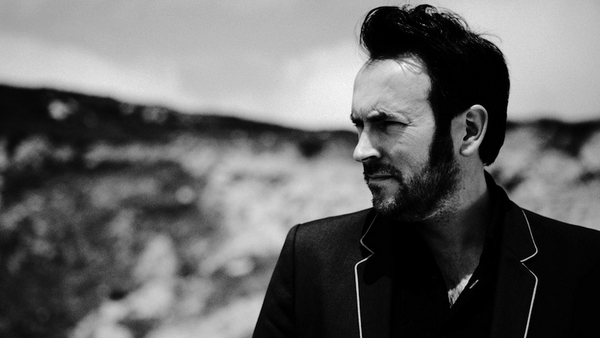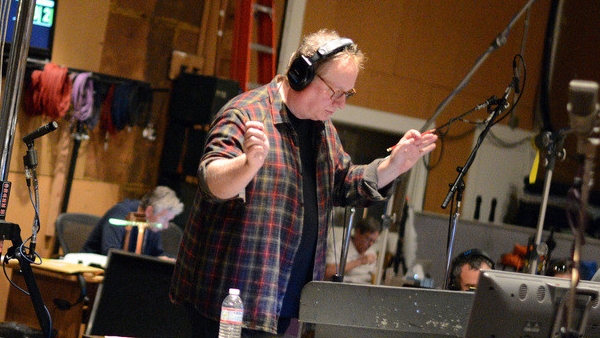 Joel McNeely is a Primetime Emmy Award-winning composer and conductor with more than 100 motion picture and television credits. He maintains a busy schedule recording, producing, conducting and composing for film. As a composer for film and television, McNeely has worked with such respected filmmakers as James Cameron, John Lasseter, Seth MacFarlane and George Lucas, among others. In addition to composing, conducting and orchestrating the score for A Million Ways to Die in the West, McNeely recently completed producing and arranging Seth MacFarlane’s new Christmas album which will be released this Fall. He also produced and arranged MacFarlane’s first album of big band and orchestral standards, “Music Is Better Than Words”.
Joel McNeely is a Primetime Emmy Award-winning composer and conductor with more than 100 motion picture and television credits. He maintains a busy schedule recording, producing, conducting and composing for film. As a composer for film and television, McNeely has worked with such respected filmmakers as James Cameron, John Lasseter, Seth MacFarlane and George Lucas, among others. In addition to composing, conducting and orchestrating the score for A Million Ways to Die in the West, McNeely recently completed producing and arranging Seth MacFarlane’s new Christmas album which will be released this Fall. He also produced and arranged MacFarlane’s first album of big band and orchestral standards, “Music Is Better Than Words”.
As a conductor, McNeely led the Royal Scottish National Orchestra in an award-winning series of rerecordings of classic film scores. He conducted the BBC Concert Orchestra in a performance of Bernard Herrmann’s music for Hitchcock films in London’s Barbican Hall, and the Los Angeles Chamber Orchestra in the world premiere of Uri Caine’s “Concerto for Two Pianos,” with Jeffrey Kahane and the composer as soloists. He has also worked with the London Symphony Orchestra, the Seattle Symphony, the Munich Philharmonic, the London Philharmonic Orchestra and the West Australian Symphony Orchestra.
Born into a musical family in Madison, Wisconsin, McNeely’s interest in music began at an early age. At age 14, he was accepted into the Interlochen Arts Academy in Michigan and began concentrated music studies in composition and flute performance. After graduating from Interlochen, McNeely headed to the University of Miami, where he studied jazz composition and performance. While still an undergraduate, he toured the world, playing with such performers as Tony Bennett, Peggy Lee, Al Green, Melissa Manchester, Chuck Mangione, Bobby Caldwell, Jaco Pastorius and David Liebman.
We got to chat with Joel at length about his process, working on so many different projects and what makes A Million Ways to Die in the West so unique to him. Enjoy the following highlights from our time with composer Joel McNeely.
GST: Joel, I really want to say right up front that I’m a big fan of your work. When I was a kid I had the Shadows of the Empire soundtrack on repeat for most of my junior high school and high school years so this is kind of a bucket list thing getting to talk to you.
JM: Wow! *laughs* I’m glad. Thank you for that. *laughs*
GST: But I’m really impressed with the work you did for A Million Ways to Die in the West. It’s a phenomenal score. Can you tell me when you first got started writing for this? Also, when someone like Seth MacFarlane says “hey, I wanna make a movie“, what’s the first thing that goes through your head?
JM: Seth first said that to me several years ago before he even did Ted, and at the time I thought “ok, that sounds cool”. But in Hollywood, you learn not to count your eggs so to speak.
But sure enough he went on to make Ted and then this Western and he still wanted me to score it, so it was very exciting to be part of it. It has been without a doubt the most amazing experience in my career and from start to finish it’s just been a joy.
GST: I’ve read that one of the things that inspired you to become a composer was meeting Elmer Bernstein at the age of 12. Can you tell me more about that?
JM: Well my dad was a writing professor at the University of Wisconsin but he had a dual career as a TV producer and writer. He was given his own TV show, a spin off of Marcus Welby, M.D. and was given the executive producer job. They gave him the series to make and he had the good sense of hiring Elmer Bernstein for the main title and the pilot episode and I got to go to that session when I was 12. Elmer knew I was a young musician so he very kindly had a set of scores made for me and he had a chair sitting on the podium so I could sit next to him while he ran the session. It was pretty amazing.
GST: I got to speak to composer Christopher Lennertz and he told me that he studied under Elmer in college. One of the most important lessons he learned was that to effectively score a comedy you actually don’t play up the comic bits. A Million Ways to Die in the West is a comedy but it has an epic Western backdrop and you play it just as serious. So what kind of research do you do to develop something like this that is part comedy, part drama and part period piece film?
JM: Well it’s not as complex as it sounds and it’s actually easier to do a score where you’re only playing it one direction. Seth made it clear from the very beginning that he didn’t want the music to acknowledge the comedy. It’s a conceit that not only Elmer started, but the Zucker brothers did in their films. So that was always the idea. It is a comedy but what I dialed in on from the start was a real heartfelt element in this epic John Ford type Western. I
t wasn’t as challenging going that route as it would have been having to go between both worlds if you know what I mean. I was actually thankful that I could play it one way and not flip flop between the epic and a comedy because honestly, I wasn’t sure how I would make that work. It’s easier to write in one world than to try to bridge the gap between two.
Each score is a puzzle to be solved. The way I try to figure out what to write is by establishing what the score is and sometimes, more importantly, what it’s not. Sometimes it takes a while to find that palette – it may be an orchestrational one, it may be compositional, it may be ethnic or it may include electronics, etc. So when I start to find a way to narrow the palette it becomes easier to execute the score. In this case, the palette was pretty much defined for me. I knew what genre I was working in and I knew what those boundaries were.
At the beginning of every project there’s a time when I just study. For A Million Ways to Die in the West I studied Aaron Copland scores and really racked my brain to learn how he achieved the sounds he did and figure out what were the key elements of that style. But for other films, I’ll develop what I call “swatches” which are little incomplete pieces of music that represent the colors I’m going to pull from in making the score. The more concise those swatches are, the easier the score tends to come together. Again, if you have all that music out there and you’re able to establish what the picture isn’t and stay within certain boundaries, the more you can identify the uniqueness and direction to the score.
GST: When you have to write something that’s period specific or retro styled, how do you go about making something original and not inevitably fall back on the trappings of other stereotypical themes or sounds?
JM: You know, that’s a good question and that was always the challenge. We didn’t want it to become generic. I guess the first way we endeavored to do that was to develop the strongest themes that you can. I tried really hard for a long time to come up with themes that are somewhat identifiable to the genre and yet unique to the film. After that I guess it’s just the integrity of composition and you just try to make it as real as possible. I was always concerned that we might be bordering on generic but I think this score has got its own thing.
GST: Seth is very musically minded. So, when he asked you to score the film, what kind of ideas did he come to the table with and what you initially imagine the film needing? What was that back and forth like?
JM: He is very specific about what he’s looking for. Seth knows exactly what kind of score he wanted and he sent me a lot of musical references of things, mostly that world of Elmer Bernstein and Alfred Newman. He never wanted to break out of that specific sound and get into spaghetti western territory. He set the parameters very clearly telling me what he wanted. He even did the temp dubs himself so in specific sequences he put exactly the music that he liked in those sequences which made it pretty clear for me.
GST: This score has a great classic feel to it, kind of like The Big Country or better Alfred Newman’s How the West Was Won. It has two songs, one of them is the hilarious title track sung by Alan Jackson. Talk to me about the process of putting a song in the movie. What comes first, is it the score and then you extrapolate tunes from it to develop theme song? Or do you write the song and pepper bits of it throughout the movie?
JM: Alan Jackson and the song came about independent of the score. My themes were already created and we decided we wanted the song to be its own thing, not culled from anything I had written because those themes were never intended to be a song.
So about halfway through the writing process we decided we would give the song a try. Seth came up with the lyrics, then he sent it to me and that sparked the idea for a tune. Then I changed some of the form of the tune and sent it back to him. Then he revised the lyrics and sent those back, etc., etc. So we went back and forth about half a dozen times and then, very soon actually, we had the song.
GST: When you have somebody sing vocals on the track, in this case Alan Jackson, does the artist just go with what’s on the page, or are they able to have some interpretation and liberties?
JM: In this case, there wasn’t a lot of room for liberties because it’s kind of a notey song. Seth had sung scratch vocals on the the backing track and sent it to Alan so he could hear how Seth wanted it sung, what the melody was and what he wanted. Then Alan came in and he added his own flair to the song but in terms of the song itself, it was kind of a quick melody so there isn’t a lot of room for playing around with it.
GST: You mention that Seth had shot a lot of the footage before you got to see any of the production. As he’s know for outlandish humor did you ever get to a point where you thought “oh man, what have I gotten myself into”?
JM: No *laughs* I had read the script so I knew what this movie was about before they started shooting. So there was never a time where I wondered that because I was working with people I know very very well. The very first time I saw a rough cut the thing that struck me about this movie is that it has a good heart. It’s a really sweet film I think in spite of all the over-the-top humor, and in the end it has some very sweet performances so knowing the people that made it are all exceptionally good people it’s almost like you’re working with a family. *laughs* It was a great working environment and couldn’t have been better.
GST: When you’re working with musicians, bit of a segue in into Seth’s albums here, what kind of responsibilities do you have when you’re asked to produce a record?
JM: The responsibility I have is executing a record that meets his vision because he is, among many, many other things, an accomplished musician. He hears composition elements independently of each other which composers can and do, he hears melody and he hears harmonies separate from the melody and he hears orchestration apart from those things and he can make make very intelligent commentary on all those things. So its very much like working with another composer.
The first step in the process is talking about what kind of songs the wanted to put on the record. He’s got this encyclopedic knowledge of music and it’s scary the amount of information he has in his head.
We were literally culling it down from a pretty massive database and then came up with the the songs and how we decided to treat them. For instance, he decided he wanted to do the song “The Night They Invented Champagne” from Gigi. In its original form it’s this kind of floaty, bouncy, Broadway kind of song, and Seth said “let’s do this like an up-tempo really aggressive fast number”. He had those specific kinds of ideas.
He wanted to do “Laura” like a Bernard Herrmann Twilight Zone episode. It’s just more of that kind of specific direction that helps him paint a picture for me and then I could write the arrangements. I’d show him my mockups and he would always have input, things he wanted to change here and there, and then when it was ready, we’d record it.
We did it very old school which was essentially live – everybody in the same room, no isolation. The drums were in the same room with the strings so everybody’s sound leaks into each other’s mics, and Seth was there too, in the room singing with the orchestra. So it was really pretty cool.
GST: When you work with somebody like Seth, or any other director, is it better for someone whether they know music or not to talk to you in terms of feelings like “I want it to feel like this” , or do you prefer working with somebody who says “I like this harmony and these notes in the scene” almost dictating what the score should be?
JM: Now that’s a really good question. In 99.9% of the cases I prefer the former. I prefer a director working with me to, as I tell them, “speak to me in dramatic terms, don’t speak to me in musical terms. Talk to me in terms of emotions, weight, pacing – any terms you would use with an actor, use with me.” It can get really muddled and confused talking to me in terms of music. Now in Seth’s case that’s completely different. As I said it’s like working with another composer so he really was speaking to me in very specific musical terms and terms that I can understand and execute.
He was speaking accurately to what he wanted using the correct terminology and that made for a very clear picture. That’s something I’ve never actually had before on a project so in all of the other cases I urge people to talk to me about what they know. As a director they know, more than anybody else, the dramatic intent.
GST: What do you think it the most unique project you’ve worked on? I ask because Shadows of the Empire seems like it must have been an interesting process – it’s a novel, there’s no screenplay or picture to score to.
JM: In terms of impact on my life I would say The Young Indiana Jones Chronicles is the most unique because first of all I had little to no idea what I was doing when I first started that show. It was my training ground and every single show was like a different movie. Every episode took place in a different part of the world and a different place in time. Also, every show had 40 some minutes of music so it was like doing 12 movies in 5 months. It was composition boot camp and I learned more working on that than I had any other time in my career.
GST: John Williams is a tough act to follow but was it easy attempting to build the themes of the show based on the through line he established with the Indiana Jones series?
JM: George Lucas, very early on, set us free of having to adhere to the music John had written and allowed myself and the other composer Laurence Rosenthal to treat each episode like its own entity. You know, when you’re in a cafe in Paris there’s not a lot of opportunity to
call back to the Indiana Jones theme. You have the small boutique Parisian hotels with quaint chamber music and there were moments where you have to score drama in a traditional manner, but every episode really had its own dramatic integrity and I really appreciated that from the beginning.
There is only one episode which actually had Harrison Ford in it and it book-ended the show right up to the movies. So in those cases we used the actual Indiana Jones themes for that. But by and large those scores are independent of the movies and I found that exhausting but exciting.
GST: Calling that composition boot camp makes a lot of sense and I can understand how it would be the most unique experience, but would you say it is your proudest work?
JM: It holds up very well after 20 years but I’d say no because I was so young and still learning through it all. If I had known then what I know now my path through it would have been a very different one. It was a rough process, figuring it all out as I went and writing things for the orchestra but I think it actually helped accelerate me. There was definitely innocence fueling my growth but truthfully I gained the most experience on this film. A Million Ways to Die in the West really was a very unique experience working with somebody who has such a unique knowledge and appreciation for music like Seth. That’s very rare.
GST: The score really has it all – big sweeping themes, slow emotional pieces as well as energetic and rousing action beats. How much music did you write and how much actually is in the movie? Are there longer cuts or suites you’ve written?
JM: Oh there’s a lot of movie that’s not on the record. There’s about 42 minutes on the soundtrack and in the movie there’s almost 70 minutes of music. I purposely made the record what it was. I know soundtrack collectors would argue with this but I don’t enjoy “complete” soundtrack albums because not all cues are created equal. Some of the soundtrack cues, the less significant ones, don’t make a good listen apart from the movie. They’re so tied to what’s going on or what isn’t going on in the film that they don’t stand on their own. So I like a well constructed soundtrack album that has a beginning, middle and an end and has a duration
that has a good listen on its own apart from the movie. Once you get past 45 minutes I start to get bored *laughs* and it becomes too much of a good thing.
I had a release of my first Tinkerbell score and Entrada was kind enough to do a release of it. It’s a score I deeply love and I’m really proud of it. There was too much music on the record for my tastes and there’s a point where it all starts to become one thing. I regret now that I didn’t cull down the music to make everything more concise and to give it a more defined impact.
Seth and I have gone back and forth on this; he likes to hear complete soundtracks but for me it’s more about something that you listen to all at once from beginning to end. You’re making a statement that has its own integrity in terms of form.
That said we are talking about releasing a follow up record. We had to go back and re-record the end credits after the CD was mastered because the end credits came out longer than we had anticipated. All along Seth had wanted me to write a fully composed end credit suite and not a composite track made by, as Seth calls it, Frankensteining cues together. I wrote the suite but it wasn’t until we got the credit roll back from the effects house that we saw we were short by about a minute and a half.
So Seth said “let’s just have you go back in and write another minute and a half. Recompose the suite, re-hire the 95 piece orchestra and go back in and re-record it”. It’s a very different piece of music with those 90 seconds of material and I like it so much better now. So we’ve been talking about releasing a deluxe edition download on iTunes to coincide with the DVD release that would have the adjusted credits track and the additional 15 minutes that weren’t on the soundtrack.
GST: You’ve had some experience working other composers’ music into your scores, like Shadows of the Empire and The Young Indiana Jones Chronicles and here, well I don’t want to give anything away although Seth MacFarlane’s tweet may have let the cat out of the bag, there’s a very small scene that features a well-known time traveling scientist. That scene is heightened and enhanced with some music from that film. So what was it like trying to insert that gag into the movie? Was it purely source music or did you conduct a sampling of the theme?
JM: That was just a little piece I wrote using Alan’s theme for the film. It was introduced fairly late in the process and we weren’t going to have any music there at all. But then just adding that little bit of color from that film got a laugh every time we saw it. We were on the fence but when we were dubbing it made us laugh every single time and it felt right so we said what the hell and put it in.
Thanks to Joel for his time. You can click this link to listen to the score to A Million Ways to Die in the West. To learn more about Joel McNeely visit his official website: www.joelmcneely.com
A Million Ways to Die in the West is in theaters now.

